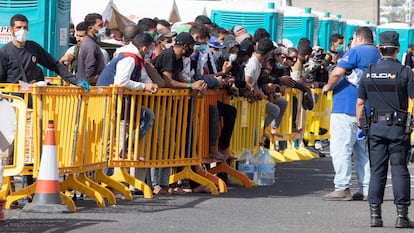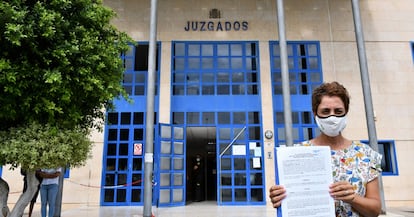Spanish court rules conditions of migrants being kept in Canary Islands ‘deplorable’ but not criminal
The ruling comes as village of Arguineguín struggles to cope with a surge in boat landings, with arrivals forced to stay in overcrowded and ‘subhuman’ centers


A Spanish court ruled on Monday that the conditions of migrants being kept in port facilities in Arguineguín, in Spain’s Canary Islands, are “deplorable” but do not constitute a criminal offense.
The Canary Islands, which are located off the northwestern coast of Africa, have seen a sharp rise in boat landings, with more than 18,000 migrants arriving this year alone. The surge has pushed the region’s shelters to breaking point and highlighted authorities’ inability to provide adequate facilities or assistance.
This crisis has been most keenly felt in Arguineguín, a village of 2,500 residents that is part of the tourist town of Mogán in Gran Canaria. At one point, more than 2,500 migrants were sleeping outside in the village’s emergency port facilities, which are meant to hold no more than 600. In recent days, however, the number of migrants in the 3,850-square-meter space has fallen below the accepted capacity.
The situation in Arguineguín, however, prompted the mayor of Mogán, Onalia Bueno, to take legal action on October 28 against the “subhuman conditions” suffered by the migrants at the port. At that time, 915 people were crowded into the emergency facilities, 495 of whom were sleeping outside. Up until that moment, the largest number that had been kept at the holding center was 1,575.

Bueno argued that the migrants were living in “overcrowded facilities” that did not meet proper health and hygienic conditions, where it was “impossible to respect the safety measures established by relevant authorities to prevent Covid-19 contagions.”
In her case, the mayor from the Citizens for Change party did not formally blame what she considered human rights violations on one specific official. When she went to file the report at the San Bartolomé de Tirajana court, she did, however, tell the media that she hoped it would identify who was “criminally responsible” within the central government.
Last Friday, the judge overseeing the case, Yanira del Carmen González, went to the port facilities with a judicial commission to examine the situation on the ground. At that point, more than a thousand people were living in the emergency center. On Monday, after completing the investigation, the judge ruled: “The reported events do not constitute an alleged criminal offense.” Although González found that the situation was “deplorable,” she did not think that any crime had been committed at the port. In her statement to shelve the case, González added that “the specific conduct of a person that could have criminal repercussions was not questioned.”
Under Spanish law, migrants cannot be detained for more than 72 hours before being placed in an immigration detention center (CIE). On the question of whether authorities had committed an alleged crime by keeping arrivals at Arguineguín for longer than that period, the judge found not only that migrants’ “freedom of movement” can be limited by protocol, but also observed a “prudent proportionality between the limitation of said fundamental right and protecting public health.” González added that it had not been proven that the migrants at the port were being held against their will or stopped from leaving.
On November 17, National Police officers removed more than 200 people from the facility as a “one-off solution” to the overcrowding problem at the port, according to sources from the Interior Ministry. That day, Bueno decided to rent buses to transport the migrants to Las Palmas de Gran Canaria, 60 kilometers away.
In response to the decision to shelve the case, Bueno told EL PAÍS that the judge “had not found an article of the Criminal Code to classify the type of crime that may be being committed in the Arguineguín port.” The mayor, however, was pleased that the magistrate had inspected the facility and highlighted that the port’s “conditions are not at all optimum” in the court statement.
Humanitarian crisis
This migratory route to Spain had not seen so much activity since the so-called “cayuco crisis” of 2006, when 31,000 people arrived in the Canary Islands in small, rickety boats. The new surge coincides with a drop in land crossings at the exclave cities of Ceuta and Melilla, where coronavirus-related border closures have significantly reduced migrant arrivals. Crossings through these cities barely number 1,500 this year, compared with nearly 5,000 last year, according to Interior Ministry figures.
The rising number of arrivals has sparked several protests in coastal towns in the Canary Islands and raised fears the far right could use the crisis for political profit. Many migrants have been relocated in facilities provided by the military and in empty hotels, even as the central government refuses to transfer them to the mainland to prevent a so-called “pull effect.”
English version by Melissa Kitson.
Tu suscripción se está usando en otro dispositivo
¿Quieres añadir otro usuario a tu suscripción?
Si continúas leyendo en este dispositivo, no se podrá leer en el otro.
FlechaTu suscripción se está usando en otro dispositivo y solo puedes acceder a EL PAÍS desde un dispositivo a la vez.
Si quieres compartir tu cuenta, cambia tu suscripción a la modalidad Premium, así podrás añadir otro usuario. Cada uno accederá con su propia cuenta de email, lo que os permitirá personalizar vuestra experiencia en EL PAÍS.
¿Tienes una suscripción de empresa? Accede aquí para contratar más cuentas.
En el caso de no saber quién está usando tu cuenta, te recomendamos cambiar tu contraseña aquí.
Si decides continuar compartiendo tu cuenta, este mensaje se mostrará en tu dispositivo y en el de la otra persona que está usando tu cuenta de forma indefinida, afectando a tu experiencia de lectura. Puedes consultar aquí los términos y condiciones de la suscripción digital.








































